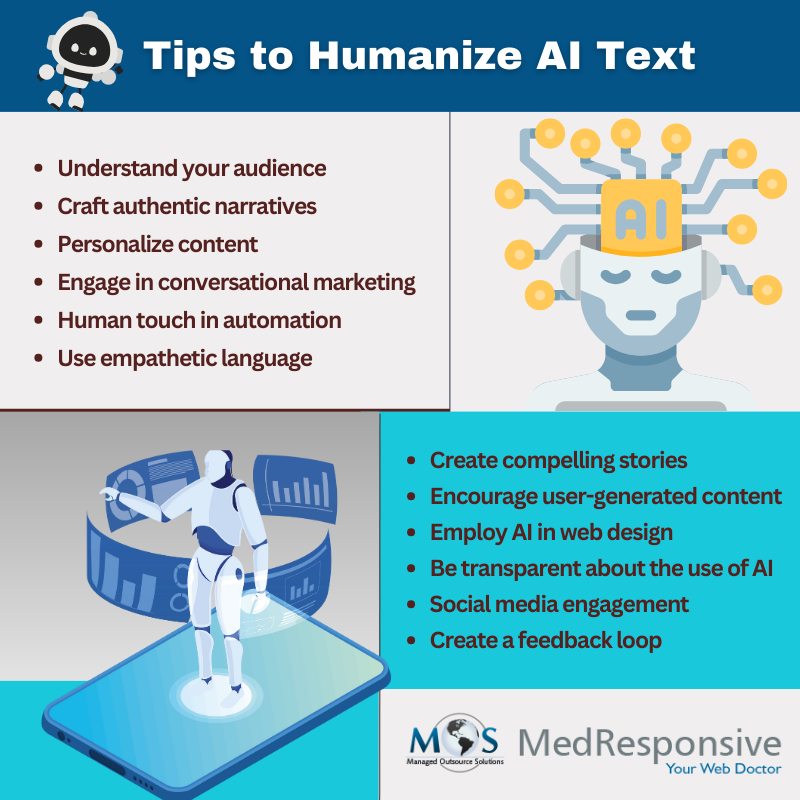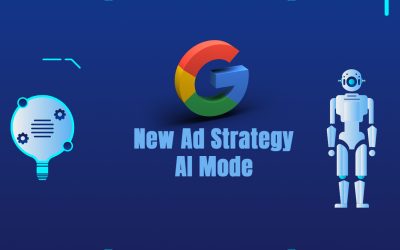AI-driven content serves as a powerful ally in marketing, customer engagement, and information dissemination. It efficiently automates content generation, offering unparalleled speed and scalability while maintaining a consistent brand voice. AI’s ability to analyze vast datasets empowers businesses to create highly personalized content that resonates with individual preferences and behaviors, thereby enhancing customer experiences. Additionally, AI content plays a critical role in data-driven decision-making, offering insights into user behavior and content performance that inform strategic choices. Ultimately, AI content is the cornerstone of modern marketing strategies, enabling businesses to connect with audiences, optimize processes, and remain competitive in an increasingly digital and data-centric world. However, humanizing AI content in marketing is a strategy that bridges the gap between the capabilities of artificial intelligence and the human touch that resonates with audiences.
Professional content writing services play a pivotal role in transforming AI content with a personal touch, by infusing it with the warmth, empathy, and relatability that resonates with audiences. These skilled writers bridge the gap between the technical capabilities of AI and the emotional connection desired in human communication.
Importance of Human-centered AI Content
Humanizing AI content is of paramount importance in modern marketing and communication for several compelling reasons:
- Enhanced user engagement: AI content with a human touch is relatable and appealing to audiences. When people feel that they are interacting with content that understands their needs and emotions, they are more likely to engage with it, leading to higher click-through rates, longer time spent on websites, and increased interaction with chatbots and virtual assistants.
- Building trust and credibility: Content that feels genuinely human is more likely to establish trust. When users feel that a brand or service understands and values their needs, they are more likely to trust the information provided and, consequently, the brand itself. Trust is a cornerstone of building lasting customer relationships.
- Improved customer experience: Humanized AI content contributes to an improved customer experience. It can answer questions, provide assistance, and engage in meaningful conversations with users. This not only resolves issues more efficiently but also leaves users with a positive impression of the brand.
- Personalization and relevance: Such content allows for more effective personalization. AI can analyze user data to tailor content to individual preferences, making it more relevant and valuable. This personal touch enhances user satisfaction and drives conversions.
- Support for emotional needs: Optimized AI content can offer emotional support in situations where users may be experiencing stress or uncertainty. This can be particularly relevant in healthcare, mental health services, or crisis hotlines.
Ways to Effectively Humanize AI Content
Humanizing AI content is essential for creating a more engaging, trustworthy, and valuable user experience. It allows AI to complement human efforts effectively while maintaining ethical and user-centered practices. This approach not only benefits businesses but also contributes to the overall advancement of AI technology in a responsible and beneficial manner.
Here are steps to effectively humanize AI content and boost your marketing efforts:
- Understand your audience: Begin by understanding your target audience’s preferences, needs, and pain points. This insight informs your AI-driven content strategy, ensuring it aligns with human interests.
- Craft authentic narratives: Use AI to generate content ideas, but then craft authentic narratives around them. Share stories, anecdotes, and real-life examples that connect with human emotions and experiences.
- Personalize content: Utilize AI algorithms to personalize content based on user data such as location, browsing history, and past interactions. Tailored content feels more human and relevant.
- Engage in conversational marketing: Implement AI-powered chatbots or virtual assistants to engage with website visitors or social media followers in real time. These bots should be programmed to provide helpful responses and mimic human conversational patterns.
- Human touch in automation: Use AI for marketing automation, but maintain a human touch in your automated messages. Ensure that automated emails, for instance, include personalization and are written in a friendly, approachable tone.
- Empathetic language: Train AI systems to use empathetic language, especially in customer service interactions. Show understanding and empathy towards customer concerns or problems.
- Storytelling: Use AI to identify and create compelling stories. Humanize your brand by sharing stories of your employees, customers, or community involvement.
- User-generated content: Encourage user-generated content that showcases real experiences with your product or service. Share these authentic voices with your audience.
- Human-centered design: Employ AI in your web design and user experience efforts, but prioritize a design that’s user-friendly and intuitive. Test for user-friendliness regularly.
- Transparency: Be transparent about the use of AI in your marketing efforts. Many consumers appreciate knowing when they are interacting with automated systems.
- Social media engagement: Use AI tools to analyze social media conversations and trends, but respond personally and genuinely to comments and messages. Acknowledge both positive and negative feedback.
- Feedback loop: Create a feedback loop where AI systems learn from customer feedback and adjust their responses and content accordingly.
An experienced digital marketing services company provides the services of professional content writers, who can craft narratives, stories, and messaging that evoke genuine human emotions, helping AI-generated content to feel less robotic and more personable. Moreover, these writers employ their creativity to give AI content a distinct personality and tone, aligning it with the brand’s values and voice. By understanding the nuances of language and the intricacies of human communication, professional content writers add depth to AI-generated content, making it more engaging, authentic, and capable of forging meaningful connections with audiences.





